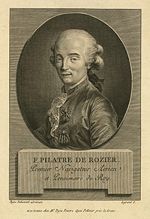Jean-François Pilâtre de Rozier, Date of Birth, Place of Birth, Date of Death
TweetJean-François Pilâtre de Rozier
French balloonistAbout Jean-François Pilâtre de Rozier
- Jean-François Pilâtre de Rozier (French pronunciation: ?[??~ f??~swa pil?t? d? ?ozje]) (30 March 1754 – 15 June 1785) was a French chemistry and physics teacher, and one of the first pioneers of aviation.
- He and François Laurent d'Arlandes made the first manned free balloon flight on 21 November 1783, in a Montgolfier balloon.
- He later died when his balloon crashed near Wimereux in the Pas-de-Calais during an attempt to fly across the English Channel.
- He and his companion, Pierre Romain, thus became the first known fatalities in an air crash.
- He also risked himself while researching the flammability of hydrogen: in "A Short History of Nearly Everything", Bill Bryson writes "In France, a chemist named Pilatre de Rozier tested the flammability of hydrogen by gulping a mouthful and blowing across an open flame, proving at a stroke that hydrogen is indeed explosively combustible and that eyebrows are not necessarily a permanent feature of one’s face."
Read more at Wikipedia
See Also
- Famous People's Birthdays on 30 March, France
- Famous People's Birthdays in March, France
- Famous physicist's Birthdays on 30 March, France
- Famous physicist's Birthdays in March, France
- Famous chemist's Birthdays on 30 March, France
- Famous chemist's Birthdays in March, France
- Famous balloonist's Birthdays on 30 March, France
- Famous balloonist's Birthdays in March, France
- Famous aircraft pilot's Birthdays on 30 March, France
- Famous aircraft pilot's Birthdays in March, France


 Date of Birth:
Date of Birth:  Place of Birth: Metz, Grand Est, France
Place of Birth: Metz, Grand Est, France